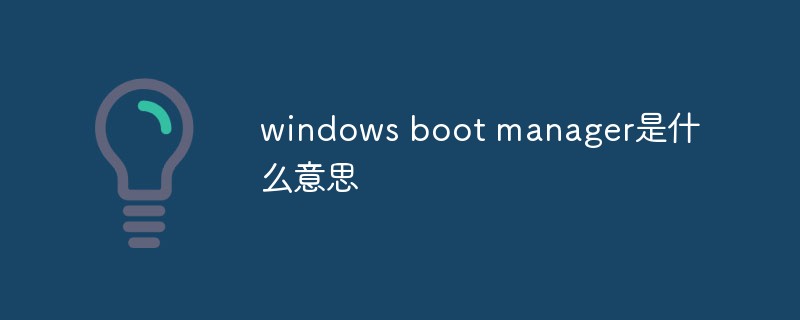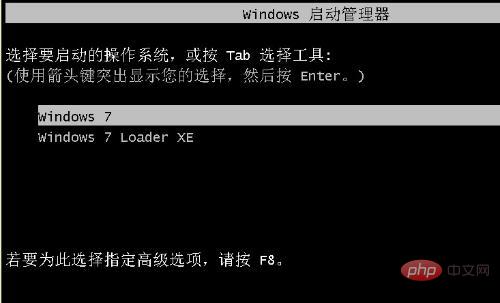Windows boot manager is a windows boot manager, which is a software that loads the computer operating system during the startup process. When a user turns on their computer, the startup manager's job is to bring the user's operating system (along with other files) to the computer's RAM so that it can boot. In fact, in addition to the operating system itself, the boot manager also allows users to boot the device to a CD/DVD drive, USB drive or floppy drive.

The operating environment of this article: Windows 7 system, Dell G3 computer.
windows boot manager is the windows boot manager.
In the concept of computer operating system, the boot manager (Boot Manager) is the windows boot program, grub, lilo, etc., which is a program that guides the operating system to start.
Windows Boot Manager is a software that loads the computer operating system during the startup process. Not only that, if you use multiple operating systems, it also helps you select a specific operating system from the list of operating systems. It is one of the many handy tools that we can use to make our life easier in a Windows environment.

#Why do you need Windows Startup Manager?
The Windows boot manager is sometimes called the boot loader. The reason is technical. All of your files, including the operating system and other critical system data, are stored on the hard drive during a power outage.
Now, when you turn on your system, the boot manager's job is to bring your operating system (along with other files) to your computer's RAM so that it can boot. In fact, in addition to the operating system itself, a boot manager also allows you to boot your device to a CD/DVD drive, USB drive, or floppy drive.
Or as Microsoft puts it on their blog:
"Windows Boot Manager is a UEFI application provided by Microsoft for setting up a boot environment. In the boot environment , the individual boot applications launched by the boot manager provide functionality for all customer-facing scenarios before the device boots."
As you can see, the boot manager plays a very important role in the working of Windows effect. Basically, it is part of the Windows boot loading architecture, which includes the Windows operating system loader (Winload.exe) and the Windows recovery loader (Winresume.exe) in addition to the Windows boot manager (Bootmgr.exe) itself. .
The boot manager is stored in the root directory and is responsible for not only booting your PC but also performing many other actions such as:
The display shows the boot menu .
Load system-specific bootloader.
Move boot parameters to bootloader.
Expand knowledge:
windows means window in Chinese. There is also a Windows computer operating system launched by Microsoft called windows.
With the continuous upgrade of computer hardware and software systems, Microsoft's Windows operating system is also constantly upgraded, from 16-bit, 32-bit to 64-bit operating systems. From the original windows1.0 to the well-known windows3.1, windows3.2, windows95, NT, 97, 98, 2000, Me, XP, Server, Vista, Windows 7, windows8, windows8.1 and various versions of windows10 Continuously updated, Microsoft has been working hard to develop and improve Windows operations.
For more related knowledge, please visit PHP Chinese website!
The above is the detailed content of what does windows boot manager mean. For more information, please follow other related articles on the PHP Chinese website!

Hot AI Tools

Undress AI Tool
Undress images for free

Undresser.AI Undress
AI-powered app for creating realistic nude photos

AI Clothes Remover
Online AI tool for removing clothes from photos.

Clothoff.io
AI clothes remover

Video Face Swap
Swap faces in any video effortlessly with our completely free AI face swap tool!

Hot Article

Hot Tools

Notepad++7.3.1
Easy-to-use and free code editor

SublimeText3 Chinese version
Chinese version, very easy to use

Zend Studio 13.0.1
Powerful PHP integrated development environment

Dreamweaver CS6
Visual web development tools

SublimeText3 Mac version
God-level code editing software (SublimeText3)
 How to fix VIDEO_TDR_FAILURE (nvlddmkm.sys)
Jul 16, 2025 am 12:08 AM
How to fix VIDEO_TDR_FAILURE (nvlddmkm.sys)
Jul 16, 2025 am 12:08 AM
When encountering the blue screen error VIDEO_TDR_FAILURE(nvlddmkm.sys), priority should be given to troubleshooting graphics card driver or hardware problems. 1. Update or rollback the graphics card driver: automatically search and update through the device manager, manually install or roll back to the old stable driver using NVIDIA official website tools; 2. Adjust the TDR mechanism: Modify the TdrDelay value in the registry to extend the system waiting time; 3. Check the graphics card hardware status: monitor the temperature, power supply, interface connection and memory module; 4. Check system interference factors: run sfc/scannow to repair system files, uninstall conflicting software, and try safe mode startup to confirm the root cause of the problem. In most cases, the driver problem is first handled. If it occurs repeatedly, it needs to be further deepened.
 What is a firewall and how does it work
Jul 08, 2025 am 12:11 AM
What is a firewall and how does it work
Jul 08, 2025 am 12:11 AM
A firewall is a network security system that monitors and controls network traffic through predefined rules to protect computers or networks from unauthorized access. Its core functions include: 1. Check the source, destination address, port and protocol of the data packet; 2. Determine whether to allow connections based on trust; 3. Block suspicious or malicious behavior; 4. Support different types such as packet filtering firewalls, status detection firewalls, application layer firewalls and next-generation firewalls; 5. Users can enable built-in firewalls through operating system settings, such as Windows Security Center or macOS system preferences; 6. The firewall should be used in combination with other security measures such as strong passwords and update software to enhance protection.
 Why do I get a User Account Control (UAC) prompt every time
Jul 13, 2025 am 12:12 AM
Why do I get a User Account Control (UAC) prompt every time
Jul 13, 2025 am 12:12 AM
UAC frequently pops up because the running program requires administrator permissions or the system setting level is too high. Common reasons include installation of software, modifying system settings, running third-party tools and other operation triggers. If using an administrator account, UAC only confirms the operation and not blocks. The methods for reducing prompts include: canceling the program to run as an administrator, lowering the UAC notification level, using a standard user account, and starting the program through the task planner. It is not recommended to turn off UAC completely because it can effectively prevent malicious programs from tampering with the system. You can set the UAC to "notify only when the program changes the computer" to balance security and experience.
 How to change your name on Facebook?
Jul 13, 2025 am 12:03 AM
How to change your name on Facebook?
Jul 13, 2025 am 12:03 AM
The Facebook name change process is simple, but you need to pay attention to the rules. First, log in to the application or web version and go to "Settings and Privacy" > "Settings" > "Personal Information" > "Name", enter a new name, and save it; secondly, you must use your real name, it cannot be modified frequently within 60 days, it cannot contain special characters or numbers, and it cannot be impersonated by others, and the review does not pass the auxiliary verification such as uploading ID cards; it usually takes effect within a few minutes to 3 working days after submission; finally, the name change will not notify friends, the homepage name will be updated simultaneously, and the old name will still be displayed in the history record.
 Why is my audio not working after a Windows update
Jul 09, 2025 am 12:10 AM
Why is my audio not working after a Windows update
Jul 09, 2025 am 12:10 AM
Audio problems are usually caused by changes in settings, abnormal drivers or system service failures. You can troubleshoot them according to the following steps: 1. Check whether the volume is muted, whether the output device is correct, try to re-plug and unplug the headset; 2. Update or roll back the audio driver through the Device Manager, uninstall if necessary and restart the computer; 3. Make sure that the "WindowsAudio" service is started and the startup type is set to automatic; 4. Run the sfc/scannow command to repair possible corrupt system files. Operate step by step in order, and the audio function can be restored in most cases.
 Is it better to shut down or sleep my computer
Jul 08, 2025 am 12:19 AM
Is it better to shut down or sleep my computer
Jul 08, 2025 am 12:19 AM
Sleep and shutdown have their own uses, and the choice depends on the usage scenario. 1. Sleep is suitable for short rest, maintaining low power consumption and quickly recovering work; 2. Shutdown is suitable for not using for a long time, installing updates or troubleshooting, and completely power outage saves energy; 3. Mixed sleep takes into account memory and hard disk saving to prevent loss of data from power outage; 4. Notebooks should pay attention to battery health to avoid excessive discharge caused by long-term sleep; 5. There may still be background tasks running in sleep mode, and it is recommended to adjust settings according to needs to optimize performance and energy consumption.
 What is the Windows Registry and is it safe to edit
Jul 08, 2025 am 12:18 AM
What is the Windows Registry and is it safe to edit
Jul 08, 2025 am 12:18 AM
TheWindowsRegistryisacriticaldatabasestoringsystemsettingsandoptions,buteditingitcanberisky.Itholdskeysandvaluesthatcontrolhardware,software,anduserpreferences,andchangesareappliedimmediatelywithoutanundooption.Editingtheregistrycanleadtosysteminstab
 How to fix 100% disk usage in Task Manager
Jul 08, 2025 am 12:41 AM
How to fix 100% disk usage in Task Manager
Jul 08, 2025 am 12:41 AM
Tofix100%diskusageinWindows,firstidentifyandstophigh-usagebackgroundprocesseslikeWindowsSearchorSuperfetchviaTaskManagerandServices.Next,reduceordisableindexingandWindowsTipsthroughSettings.ThenpauseorresetWindowsUpdatesifthey'recausingspikes.Finally





